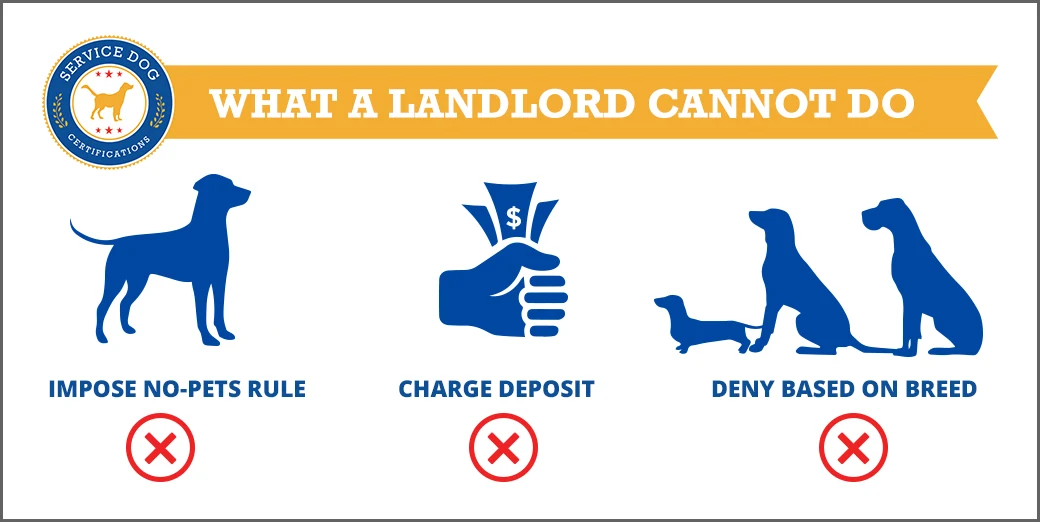Home Page › Blog › Can Landlords Deny a Service Dog?
Can Landlords Deny a Service Dog?

Under the Fair Housing Act, housing providers such as landlords, HOAs, co-ops, and condos must reasonably accommodate service dogs. Housing providers can only deny a tenant’s request to live with their service dog in limited circumstances. In this article, we’ll explore what these exceptions are and what rights you have as a service dog owner in residential housing.
Laws that Protect Assistance Animals in No Pet Housing
There are two types of assistance animals with special housing rights: service dogs and emotional support animals. If you have a mental or physical disability that requires you to have either a service dog or an emotional support animal, you are protected from discrimination under the federal Fair Housing Act. Service dog owners have the following rights:
- Access to “no pets” policy housing
- Exemption from monthly pet fees
- Exemption from pet deposits
- Exemption from breed or weight restrictions
Housing providers must accommodate assistance animals unless they have a valid exemption, even if their building has a policy that bans all pets. Under federal Fair Housing rules, service dogs and emotional support animals are not considered pets and are thus not subject to rules that apply to normal pets.
A major difference between an emotional support animal and a service dog is that service dogs must be individually trained to perform a task or job relating to the handler’s disability. Emotional support animals, on the other hand, do not undergo any specialized training and assist with mental health disabilities just by being present in their owner’s life.
When can a landlord reject a service dog?
The right to live with your service dog is not absolute. Landlords can reject a tenant’s request to live with their service dog if they have a valid exemption. For example, if the landlord has determined that the tenant’s service dog poses a health or safety risk to others, they may properly deny accommodation if the risks can’t be mitigated.
Some smaller landlords are also exempt from Fair Housing requirements. The Fair Housing Act exempts owner-occupied buildings with no more than four units and single-family houses sold or rented by the owner without an agent.
Landlords cannot reject a service dog solely because they merely perceive it as dangerous or a health risk to others without evidence. Landlords cannot deny a service dog, for example, solely because it is a certain breed.
Fair Housing rules also override any building policies that ban pets. A housing provider cannot deny a service dog accommodation because their building has a strict ban on all animals. A housing provider also can’t deny a service dog for being too big just because their building has a size/weight restriction on pets.

How can a landlord verify a service dog?
Under HUD guidelines, housing providers are permitted to verify a service dog by asking two questions:
- “Is the animal required because of a disability?” and
- “What work or task has the animal been trained to perform?”
Housing providers are never permitted to ask about the nature or extent of a tenant’s disability or demand documentation as proof of service dog status. However, under HUD guidelines, housing providers are allowed to make the truth and accuracy of information provided during the service dog request part of the representations made by the tenant. This applies under a lease or housing agreement to the extent that the lease or agreement requires the truth and accuracy of other material information.
What that essentially means is that if you lie about the status of your service dog, your landlord may have the right to take actions against you under the terms of your lease. It’s also common sense that faking the need for a service dog is unethical, but it is also outlawed in many jurisdictions.
Overview on Service Dog Access Rights
Service dog owners have rights when it comes to housing and public access rights under the Americans with Disabilities Act. When you have a legitimate service dog, you have the right to access areas where the general public is allowed. This can include retail locations, restaurants, hotels, and beaches. Service dogs can also accompany their handlers in the cabin of airplanes free of charge.

Certifications and Vests for Service Dogs
Certificates, ID cards, and vests are not mandatory for service dogs, but many service dog owners choose to use them. You can obtain these items after your service dog has been fully trained to perform the task or job related to your disability.
Registering a service dog and obtaining items like certificates, ID cards, and vests help signal to other tenants in your building and members of the public that your dog is a working animal. It can help dispel any confusion about why your service dog is present, especially if your building has a ban on pets.
You can register your service dog here: Service Dog Certification.
You can also purchase a service dog vest at this link: Service Dog Vest.
Having a certificate, vest, or ID card for your service dog is an easy way to let others know that your canine companion is a working animal and, therefore, should be treated as such.
About the Author: The writing team at Service Dog Certifications is made up of folks who really know their stuff when it comes to disability laws and assistance animals. Many of our writers and editors have service dogs themselves and share insights from their own experiences. All of us have a passion for disability rights and animals.
121 comments
Leave a Reply Cancel reply
Latest Posts

How to Bring a Service Dog to Disneyland
Trained service dogs are more than welcome to join their handlers at Disneyland. In this guide, we’ll explain Disneyland’s policies and give practical advice for bringing a service dog to Disneyland for the first time. Disneyland’s Service Dog Policies The Magic Kingdom is happy to welcome trained service dogs across most park locations! They kindly […]

Read More

Can Dogs Eat Tomatoes?
Yes! Dogs can safely enjoy tomatoes, but there are a few risks to be aware of so you can feed your dog responsibly. Fully ripe tomatoes (without the stems and leaves) can actually have nutrients that are good for your pup. Tomatoes have chlorogenic acid, an antioxidant that can have anti-inflammatory effects in cells. They’re […]

Read More

Can a Primary Care Doctor Write an ESA Letter?
Your family doctor, also called a primary care physician (PCP), can write a letter recommending an emotional support animal. We’ll explain what legally gives them that ability and explore what better options might be available for you. Why are Physicians Able to Write an ESA Letter? To turn your pet into an emotional support animal, […]

Read More







I live at leisure park towers in Bristol VA and. Elderly ladies grandson was denied visitation with her because he had a therapy or service dog isn’t that illegal on the landlords behalf if so what right does the grandmother have and what should she do?
Landlords have to accommodate valid service dogs under the ADA and Fair Housing Act. Therapy dogs however (dogs trained to provide comfort to others) do not have the same rights.
Thanks…learned something I didn’t know about having a service dog.Im saving some money. Certainly great info. Mrs. B. J. R.
Can you provide more information of how to substantiate that a tenant’s alleged therapy dog in in fact a “therapy” dog. FYI the tenant works 8 and 10 hour shifts and the “therapy “ barks throughout the day even if the tenant up stairs walks through out their apartment from one room to another.
If a person a work at competitive employment are they permitted pursuant to ADA or other regulations to take “Therapy dog” to work which them?
I thank you in advance for this information.
A “therapy dog” does not have any housing rights. Your tenant may be claiming they have an emotional support animal, in which case they would need a letter from a licensed healthcare professional. Please see this article for more details: https://www.servicedogcertifications.org/how-to-get-an-emotional-support-dog-letter/
We are a co-op campground. What are our obligations for a service animal that is on our insurance list of dogs not allowed? Can we ask for a copy of the dogs certification?
You cannot require a handler to show a certification as they are completely optional and not mandatory. You may want to contact your insurance company to clarify that legally required disability accommodations would be exempt.
Can I evict a person that never told me they had a dog in my house. Iam the landlord of this home and found out there was a dog living there. I was never told this nor was she ever charged a pet deposit. She claims her dog is a service dog.
If the person has a legitimate service dog you cannot evict them unless you have a valid exemption – for example, if the service dog poses a health or safety threat to others. You can verify the tenant has a service dog by asking two questions: 1. Is the dog required due to a disability? and 2. What work or task has the dog been trained to perform?
What if a applicant does not disclose on the lease that they have a pet? In my situation, I was told by the tenant, she has a service dog after the lease was being prepared. I feel that she was not being upfront with me. Do I have any recourse? She is sending me the paperwork on the service dog.
A couple of things to note: 1. Tenants can disclose their service animal at any time, it does not have to be prior to the lease and 2. You should not request paperwork for a service dog, that may violate ADA and Fair Housing rules. You can verify if the tenant has a service dog by asking the two questions allowed under the ADA.